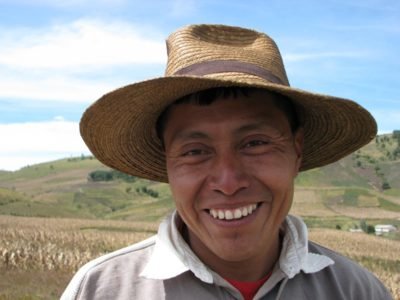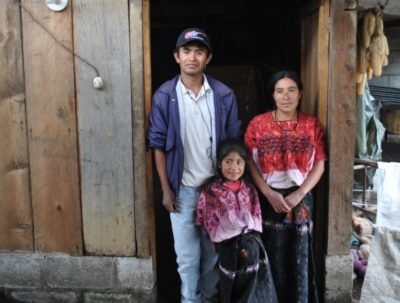Micro-credits for/by the community

Yabal started a small loan program with the community of Chuicutama 7 years ago. After receiving a private donation, we asked the community what project they would like to use the money for. The community decided to use these funds to create a micro-credit system for their families to rent land for corn cultivation. As these families don’t own land, they rent plots 3 hours away from the community to grow corn, their families’ principal food throughout the year.
Yabal began by lending each family money at the beginning of the year to pay their land-rent, and then each month they paid us back little by little. Each year we added a bit more money to the fund to include more families in the project. During these last seven years, families have not only been able to rent farmland, but have also started small businesses with these loans. Some of these new community businesses include corn grinders, small stores, a pharmacy, chicken and turkey businesses, huipil weaving businesses, and new commercial crop production such as potatoes and peas.
During these 7 years, we’ve also transitioned the monitoring and collecting of payments over to the community members who have formed a rotating micro-credit leadership council. They manage the repayments each month and decide how to divide the loans amongst themselves and new members.
In seven years, not one family has ever missed a payment.
Yabal has never collected interest on these loans, a practice which is unusual for most micro-credit loans. Many organizations and for-profit banks collect around 25-30% interest on small microloans. This means that if a family were to borrow $90 for a year, they would have to pay an extra $30 throughout the year in interest that would go to the organization or bank. To us, this does not seem to be the magical poverty-fighting solution that many people in the development world think it is. Perhaps some borrowers are able to double their original investment and make a profit, but if something goes wrong, it’s easy for that 30% to be a big risk for a small new business.
 At the beginning of this year, Yabal decided to turn over this original micro-credit fund to the community for them to manage amongst themselves autonomously. Yabal worked with them to create an interest paying system amongst recipients in order for them to grow their fund each year and create checks and balances within the group to avoid any corruption or potential issues with money management. Each member now agrees to pay back 7% interest on their small loan. That interest stays within the group and is used to grow their fund in order to lend money to new members that wish to join or to give bigger loans to individual members. In the future, depending on the group decision, that interest money could be used to fund community projects, such as repairs to their water system, fix roads, help with educational expenses, etc.
At the beginning of this year, Yabal decided to turn over this original micro-credit fund to the community for them to manage amongst themselves autonomously. Yabal worked with them to create an interest paying system amongst recipients in order for them to grow their fund each year and create checks and balances within the group to avoid any corruption or potential issues with money management. Each member now agrees to pay back 7% interest on their small loan. That interest stays within the group and is used to grow their fund in order to lend money to new members that wish to join or to give bigger loans to individual members. In the future, depending on the group decision, that interest money could be used to fund community projects, such as repairs to their water system, fix roads, help with educational expenses, etc.
For us, the important part of collecting interest on these micro-loans is that this interest stays in the community and becomes a collective way for the community to grow capital and save. And that ultimately, it is a collective decision of the group to implement an interest system amongst themselves.
This November, after the first year of experimenting with collecting interest amongst themselves, we are happy to report that the community of Chuicutama has successfully completed one year of managing the micro-loans and has collected enough money in interest to bring on 3 new families into their loan program for the coming year!
 While micro loans are important for many people to start businesses, especially when they are considered too high risk for many banks, if we’re looking at it as a way to alleviate poverty, it falls short. These micro-credits with high interest can potentially create more debt and a dependence on outside micro-lenders that end up keeping the profit for themselves and for their own operations. For true poverty alleviation and empowerment, a grant combined with this type of savings circle seems much more effective. It’s a common saying that «you need money to make money», and it’s hard to save and grow your money when you have none. What better way for communities to increase their own capital and communal funds then giving them the initial small seed money to start, grow, and ultimately manage their own savings circles?
While micro loans are important for many people to start businesses, especially when they are considered too high risk for many banks, if we’re looking at it as a way to alleviate poverty, it falls short. These micro-credits with high interest can potentially create more debt and a dependence on outside micro-lenders that end up keeping the profit for themselves and for their own operations. For true poverty alleviation and empowerment, a grant combined with this type of savings circle seems much more effective. It’s a common saying that «you need money to make money», and it’s hard to save and grow your money when you have none. What better way for communities to increase their own capital and communal funds then giving them the initial small seed money to start, grow, and ultimately manage their own savings circles?

